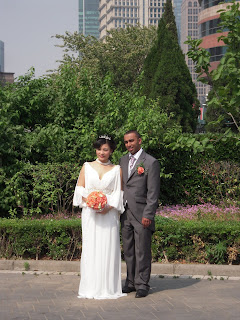After the weekend in Halong Bay I took a 13hr train down the coast to Hue, famous for its huge citadel and was the scene of an intense battle between US forces and the Viet Cong during the Vietnam war. As part of the Tet Offensive in January 1968, the Viet Cong and NVA launched an attack on the city and captured the citadel. They were slowly beaten back by US Marines and supporting forces over the next month but with huge losses on both sides. The US had previously been under orders not to destroy the historical sites, however this was relaxed once it was clear that the Viet Cong were embedded. The citadel suffered heavy damage due to bombs and napalm and weeks of intense door-to-door fighting. but is slowly being repaired.
 |
| Gate to Hue citadel |
Though it doesn't look it, most of the citadel is only about 200 years old - the damage from the war, evident in bomb craters and destroyed buildings, makes it look much older. I walked around some of the 1250 acres of grounds, enjoying the peace and quiet away from the bustle of the city.
Aside from the citadel and a few tombs on the outskirts of town, Hue didn't have that much to see so, after stuffing my face with great French food (including real(!!!) cheese), I packed up and headed to Hoi An [why do all Vietnamese places start with H??]. I arrived on the evening of the full moon celebrations, where the streetlights are replaced by lanterns and the town has a cosy and relaxed vibe. After the festivities the town was quiet and I took some time out to lounge in the cafes by the waterfront and get a few cheap tailored shirts (every second shop is a tailor) and I could have got more besides [do all fittings come with "massages"?].
 |
| Hoi An waterfront |
 |
| Thu Bon River |
I took a tour to the ancient Champa temples of My Son. They were rediscovered by the French at the end of the 19th century, who then proceeded to take lots of the artefacts back to Paris for "safe-keeping", including, bizarrely, the heads of most of the statues. In the Vietnam war the Viet Cong used My Son as a operating base, and, like Hue citadel, it was bombed by the US. Some of the surrounding area is still mined and efforts are under way to remove unexploded ordnance from the site. The temple complex is pretty small and I was a little unimpressed but I looked at it as a teaser for Angkor Wat in 2 weeks' time.
























